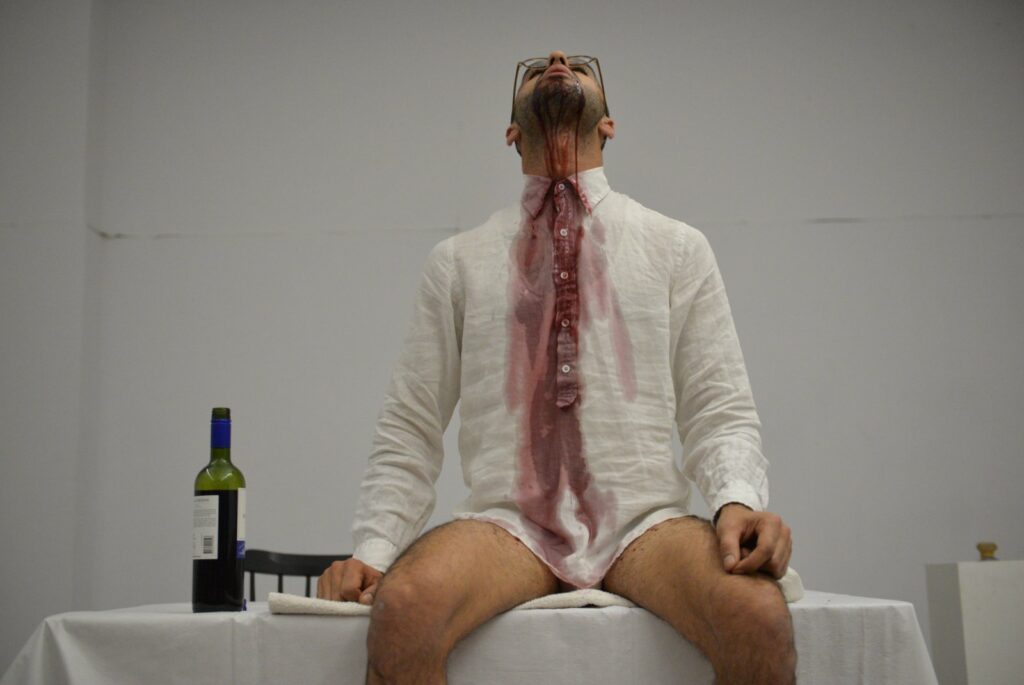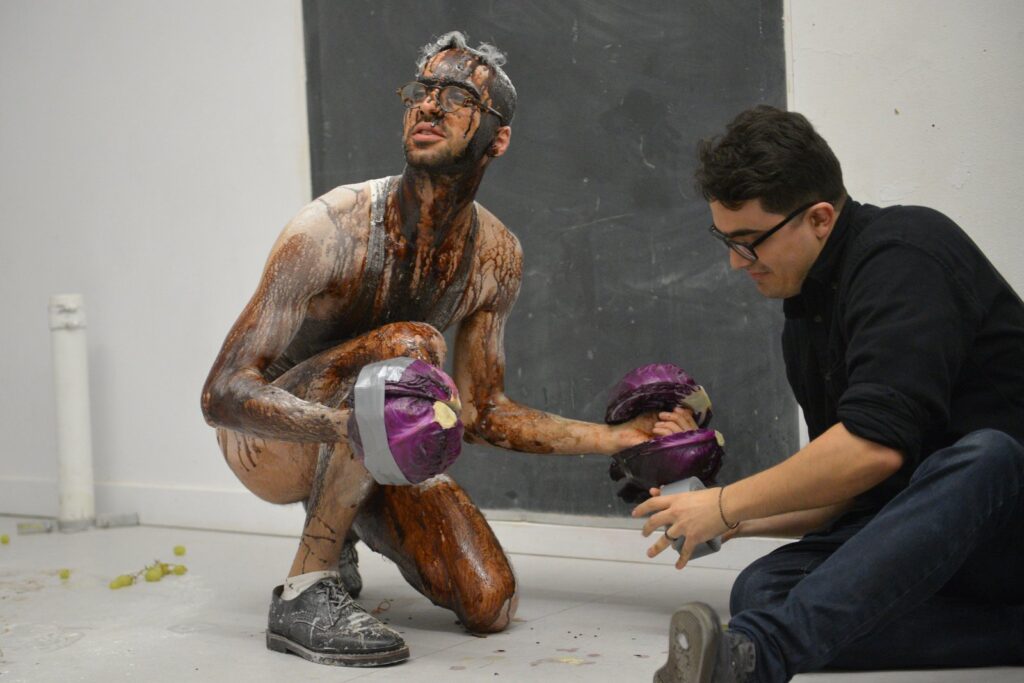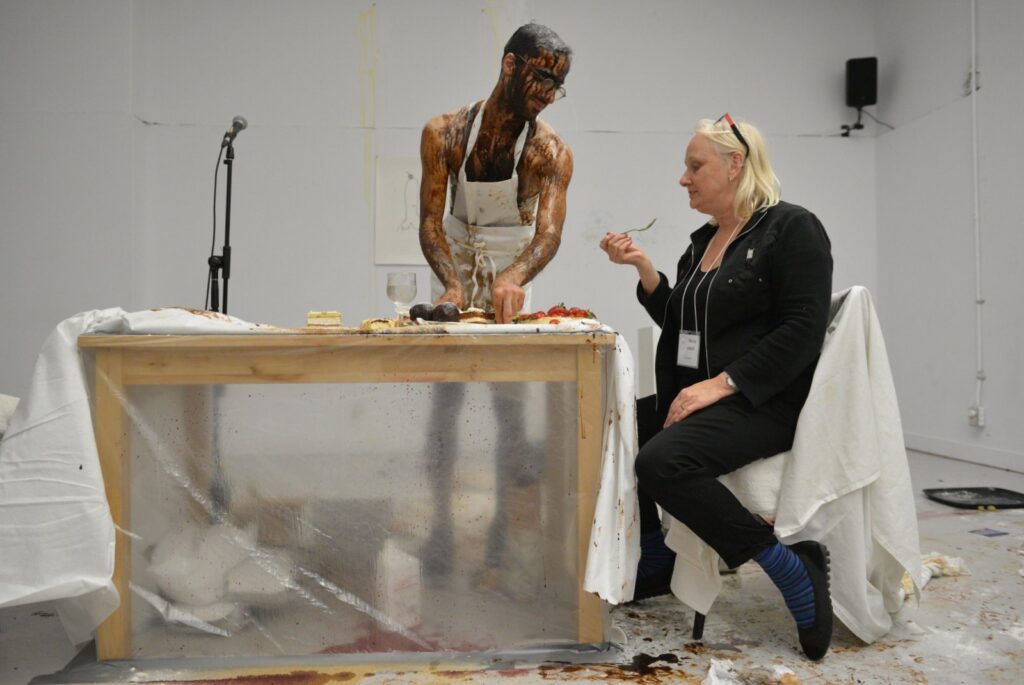By Alison Cooley

Basil AlZeri, clad in a white dress shirt, hands neatly folded across a pristine white-clothed table, announces that his performance will be called “The Death of Performance Art.” It seems absurd to me that no one has ever given this title to their work before—a cursory Google search yields only a lot of press about Marina Abramović, including a Hyperallergic article heralding the death of her work (and all performance by proxy) after that woeful day upon which Jay-Z involved her in his performance of the rap art project, “Picasso Baby.” There’s a hint of current-day Abramović in AlZeri’s sensational claim that his performance will act as a retrospective of 32 years of performance art. This slice of performance art history mirrors AlZeri’s own lifetime (not as a performer, but on the planet), and so it serves as a catalogue of events contemporaneous with his coming-of-age, and of the practices his mentors, teachers, and older peers are most likely to gaze upon with fondness and nostalgia, eyes glinting as they introduce their young pupils and whisper, “I was there!” AlZeri treats these iconic works with an amount of respect both utterly inappropriate and totally necessary: as he declares the beginning of his performative endeavor, stepping out from behind the table, the artist reveals he is wearing no pants to accompany his prim and proper shirt, sporting only a pair of tighty-whiteys.
As soon as AlZeri’s performance begins, it’s clear mayhem is about to erupt. A projection in the upper corner of the studio behind the artist gives the name and year of each performance as AlZeri re-performs it, and a timer counts down the seconds he has left to complete his imitation. Nothing is in chronological order a AlZeri lurches from one performance to the next. A piercing alarm sounds at regular short intervals signalling the need to move on. Some of the performances are immediately recognizable (Jana Sterbak’s Meat Dress, for example, which AlZeri reenacts by draping his body in cold cuts). Others bear on the context of the festival and its organizers (before beginning one reenactment, he apologizes profusely to Paul Couillard before launching into a high-speed version of Couillard’s 1998 24-hour durational performance Trace Elements). Each work, however, confronts the legacies of performance art as they concern foodstuffs—whether or not AlZeri replicates the original materials seems irrelevant. Nesquik proves a suitable substitute for almost anything.

Over the course of AlZeri’s performance, his white shirt becomes stained, the tablecloth drips, there’s red wine on the floor, the artist’s glasses become caked in chocolate. The hands and arms of audience members he recruits for interactive moments of his rapid-fire peformances cannot escape being similarly smeared. While ketchup, pudding, wine, and chocolate make their way back into his performance by cycles, some elements are cast aside immediately (the cabbages he has a volunteer strap to his fists to recreate Sylvette Babin’s Punching Wall, an onion he takes a few merciless bites from in restaging Marina Abramović’s The Onion). AlZeri is hurried. Each performance is frustratingly incomplete. The alarm is a jolt every time. AlZeri interjects commentary, hurriedly saying “you get the idea!” as he abandons one performance for the next. Nearing the end, the room reaches an excessive fever pitch. Everything in his performance area is absolutely, wretchedly coated in food waste. The crowd has been laughing for almost the entirety of the event.

As AlZeri’s final performance, he speaks into the microphone, at first inquisitively: “Tanya Mars?” The audience knows what’s next: “In Pursuit of Happiness, 2005” is projected directly above the scene. In no time flat, AlZeri has the audience chanting along with him, and a loop pedal transforms his rhythmic chanting into a fever-pitched disco. AlZeri presents Mars with several (somehow still pristine) cakes, and we writhe along as she spends the last two minutes of the performance taking steady bites.
AlZeri’s performance builds on the established aesthetics of food-works (of abjection, disgust, endurance, the politics of the kitchen), but it also responds to the contemporary culture of performance art, especially in a relational age, where offering food can become a short-hand for community engagement. AlZeri has worked with food as a medium for the past several years, addressing colonial issues in his cooking performances which unfurl over the course of hours on Skype with his mother directing him in the preparation of her Palestinian dishes, from Dubai. Palestinian food’s resiginification under Israeli rule sits central to this work. But the food in The Death of Performance Art could almost be described as non-food. Flour, ketchup, Nesquik, cabbage, onions—each seems to become bare over the course of the performance (although each undoubtedly has its own signification, these are evacuated in the excess of Alzeri’s endeavor). AlZeri’s performance enacts a debt to the legacy of food in performance, and to its enthusiastic, ambivalent, and varied politics. But it also mocks that legacy, pointing to something not unlike Marina and Jay-Z: the moment food as a medium collapses upon itself.
